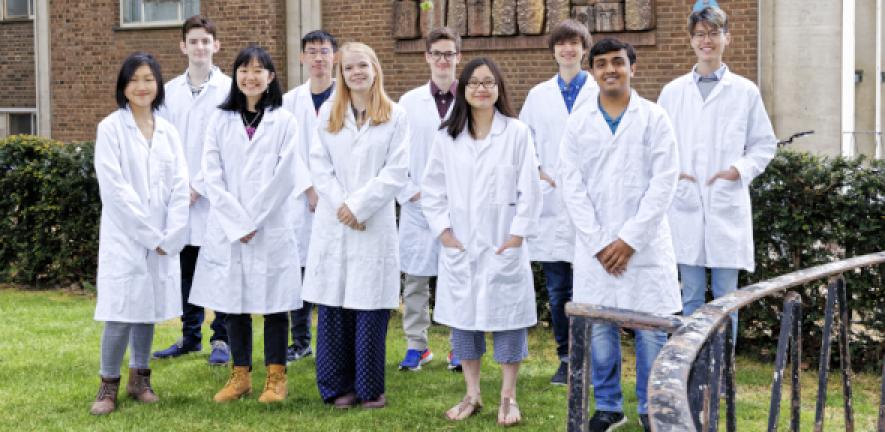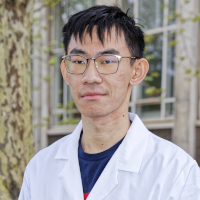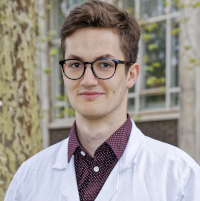
Nobel prize winner M. Stanley Whittingham, who is known for his role in the development of lithium-ion batteries, spoke at the online Varsity Sci symposium, a start-of-term event hosted jointly by the Cambridge and Oxford science societies.
Since then, with live talks back on in the Wolfson Lecture Theatre, the ChemSoc committee haven’t looked back. Speakers have included the President of the Royal Society of Chemistry, who spoke on Chemistry for Sustainability; a Professor from the University of Strasbourg known for his pioneering work in nanoscience; and a synthetic chemist whose research bridges the gap between organic synthesis, materials chemistry and supramolecular chemistry.
Meng Siong Chen (left) and Tristan Spreng

 “Covid really affected us last year, but things are getting better,” explains Meng Siong Chen, a second-year Natsci student at Downing College, who was recently elected as ChemSoc’s Inclusion and Outreach officer. “Having ‘in-person’ events again has made it easier to build that sense of community that we all missed last year.”
“Covid really affected us last year, but things are getting better,” explains Meng Siong Chen, a second-year Natsci student at Downing College, who was recently elected as ChemSoc’s Inclusion and Outreach officer. “Having ‘in-person’ events again has made it easier to build that sense of community that we all missed last year.”
But with Covid rates still unpredictable, all is not completely back to normal. “We are still only allowed half capacity in the lecture theatre, so we can accommodate about 70,” says Tristan Spreng, a third-year Natsci student at Trinity who serves as ChemSoc’s co-President with St Catharine’s third-year student Richard Danylyuk. Tristan notes sadly that the traditional drinks and snacks served before each talk are also currently a no-go.
“But even with no reception, it’s still nice to see people talking to each other and meeting,” says Siong Cheng. “Online is good, but it’s still no substitute for meeting others in person.”
Sharing a common interest in chemistry
And that is one of the aims of ChemSoc – to bring together University members who share a common interest in chemistry. Siong Chen says: “People tend to stay in college groups at lectures and practicals, so these events are a good way not only to learn about different areas of science, but also to mix and meet chemists from other colleges.”
To fulfil its aim, the group has also organised several social events, including a dinner at Churchill College, which was booked out in a day and had over 50 in attendance. “The main idea behind the dinner was to get the chemists together and revive our community spirit,” says Siong Chen. “People just wanted to meet, which wasn’t possible last year,” adds Tristan. The chemistry theme was kept up with a ‘pop quiz’ which the pair say was “just the right balance” between difficulty and accessibility. The event was so well received that plans are afoot for another dinner next term.
Besides speakers and social events, the ChemSoc committee have also been considering other ways to build up a buzz about Chemistry. Earlier this month they organised an Internship event, at which two recent graduates who now work at AstraZeneca and two student speakers talked about their experiences.
“Another of our goals is to get more postgraduate students from the Department involved,” says Tristan. “We’ve thought about organising a PhD mentoring scheme, where a postgrad could be linked with a group of undergrads and talk to them about more research-related issues.” The group is also hoping to hold some outreach events for the public, enlisting the talents of science communicators.
ChemSoc is also collaborating more with other societies such as the Nanotechnology Society (known as CUNanoSoc), with whom they are co-hosting an upcoming talk by Professor Tuomas Knowles, who will discuss his recent ground breaking research into liquid liquid phase separation. The final speaker of the term will be Dr Alexander Forse, also of this Department, who researches carbon capture to mitigate climate change.
Where credit is due
Tristan and Siong Chen freely credit the other ChemSoc committee members with this term’s successful programme. “It’s been a real team effort to organise the events,” they say.
When asked what they would say to Natsci students who are considering joining, Tristan laughs and says: “I would say you’re probably already a member, because all undergrads who take at least one chemistry subject are automatically part of the chemistry community.” But he and Siong Chen would definitely invite students to consider becoming an officer, saying the experience can give improved organisational skills, practice in planning, and opportunities to meet interesting people after events.
Both Tristan and Siong Chen say they are thinking about staying on to do postgraduate research. Tristan is interested in the work of Dr Alexander Forse, who researches advanced materials and carbon capture. Siong Chen has dabbled in characterization and molecular biology but is unsure what he wants to specialise in. “I’m still not sure what I want to do – but I’m enjoying finding out more about everything.”
New sponsors
ChemSoc has two new sponsors this year: Sphere Fluidics, a life sciences company whose technology was originally spun out of the Abell and Scherman groups in this Department; and Activotec, a locally based laboratory equipment supplier. Other sponsors include Teach First and TPP.
ChemSoc Committee Officers in photo above:
Back row (from left): Agustin Lorusso, sponsorship officer; Meng Siong Chen, inclusion and outreach officer; Tristan Spreng and Richard Danylyuk, co-presidents; Jerroy Chang, publicity officer.
Front row (from left): Xuehuai He, webmaster; Alea Yang Ni, logistics officer; Pip Knight, publicity officer; Kirsten See, secretary; Aryaman Sokhal, junior treasurer.

